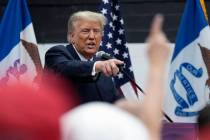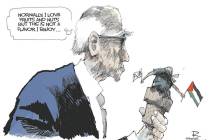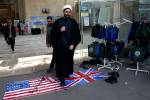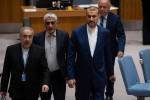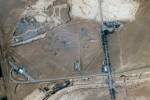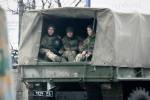Obama disavows American power
In his first address to the United Nations General Assembly, President Barack Obama Wednesday summoned world leaders to help him bring about a world free of nuclear weapons.
But drawing most immediate attention was his declaration that "America does not accept the legitimacy of continued Israeli settlements" outside the embattled nation's fragile 1948 boundaries, which it has had to defend in desperate defensive wars against vastly more numerous enemies three times in the past 60 years.
Mr. Obama just put Israel "on the chopping block," responded John Bolton, former U.S. ambassador to the U.N.
The problem is that Mr. Obama does not speak in a vacuum before the international body, which has long served as a vessel for fiercely anti-Israeli libel and propaganda.
His criticism of Israel for allowing her citizens living near the capital of Jerusalem to add new rooms on their houses for their growing families (dubbed "expansion of the settlements") risked giving the appearance that he was making common cause with Iranian President Mahmoud Ahmadinejad, who shortly thereafter rose to predictably accuse Israel of "inhuman policies."
"How can crimes of the occupiers against defenseless women and children and destruction of their homes, farms, hospitals and schools be supported unconditionally by certain governments?" Mr. Ahmadinejad asked, referring to Israel and, presumably, the pre-Obama United States -- though the question would better be asked of the Palestinians who subject Israeli civilians to indiscriminate deadly rocket attacks.
"If we are honest with ourselves," Mr. Obama told the opening session of the General Assembly, "we need to admit that we are not living up" to the shared responsibility to meet such challenges as "protracted conflicts that grind on and on; genocide; mass atrocities; more nations with nuclear weapons; melting ice caps and ravaged populations; persistent poverty and pandemic disease."
Mr. Obama said he's led by example by prohibiting torture of detainees -- a blatant political swipe in an inappropriate venue at the previous U.S. administration, which certainly didn't systematically "torture" captured saboteurs as that practice is understood in most of the world. He added that he is working to reach the goal of "a world without nuclear weapons."
He said the G-20 industrialized nations have spent $2 trillion to keep the world from the brink of economic collapse, and the United States has demonstrated its commitment to the world body by joining the Human Rights Council.
In his most encouraging statement, President Obama said "Wealthy nations must open their markets to more goods and extend a hand to those with less."
As ever, though, the question is whether Mr. Obama's rhetoric bears any relation to reality. Didn't his administration just slap a 30 percent punitive tariff on low-cost Chinese tires, launching a trade war during a recession? Is his administration about to defy the wishes of powerful American sugar, ethanol, cotton and peanut producers (for starters), by repealing quotas and tariffs and allowing Caribbean, African, and South American nations to freely export those commodities to this country at far lower prices than American consumers now pay? Not likely.
Central Europeans who hoped the U.S. would help defend them against a resurgent Russia are still reeling from Mr. Obama's announcement last week that he'll cancel a planned missile defense system there.
Since there has been no return to hard money or sound banking practices, it might be more appropriate for the president to have said the G-20 governments have spent $2 trillion they don't have to "paper over" the problems caused by their own unwise economic meddling, and have thus kept the world "on the brink of" economic collapse.
As for nuclear disarmament, no one wants nuclear war. But can Mr. Obama -- whose knowledge of history does appear somewhat fuzzy ((No, the transcontinental railroad was not completed during the Civil War, and it's not true that we "import more oil today than ever before") -- really not know that a perception of American weakness helped lead the Japanese to attack Pearl Harbor in 1941; that the perceived weakness of the appeasement-prone Neville Chamberlain helped embolden Hitler to seize Poland in 1939; that Khrushchev's perception of John F. Kennedy's youth and inexperience encouraged the Russians to initiate what became the Cuban Missile Crisis of 1962?
If sober-minded nations disarm, won't the balance of power rest with the first loony to build a new warhead?
As for "more nations with nuclear weapons; melting ice caps and ravaged populations; persistent poverty and pandemic disease": The ice caps are not melting; the war on disease was going quite well until the American DDT ban allowed malaria to return; the president failed to point out that the persistent answer to poverty down through the centuries has been shown to be the untrammeled free market -- and does anyone really believe Mr. Obama plans anything more than hollow talk to stop Iran and North Korea from going nuclear?
The members of the U.N.'s so-called "Human Rights Council" are among the worst and most cynical violators of their subjects' human rights. But Mr. Obama just stamped their hypocrisy with the American seal of approval by joining up.
Nile Gardiner, a Washington-based British foreign affairs analyst, commented Wednesday, "Overall this was a staggeringly naïve speech by President Obama. ... All that was missing was a conga of hippies dancing through the aisles with a rousing rendition of 'Kumbaya.' " Barack Obama, Mr. Gardiner comments, is "a leader who seems embarrassed, even ashamed, by the power and greatness of his own country."
Having forsworn the unilateral exercise of power, what useful guidance will Mr. Obama's idealistic pronouncements offer if a real crisis comes calling?








